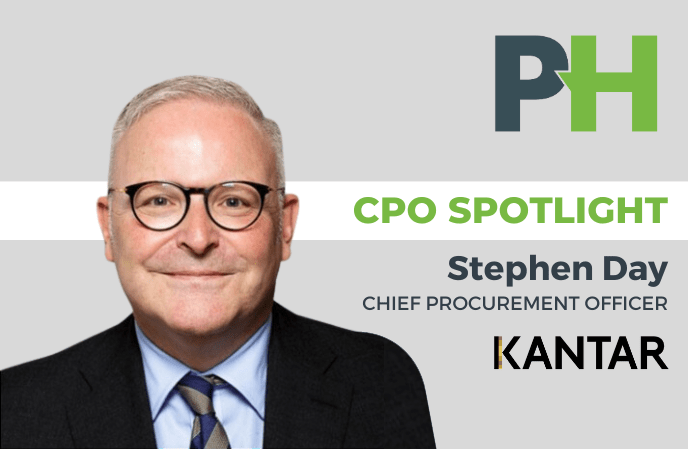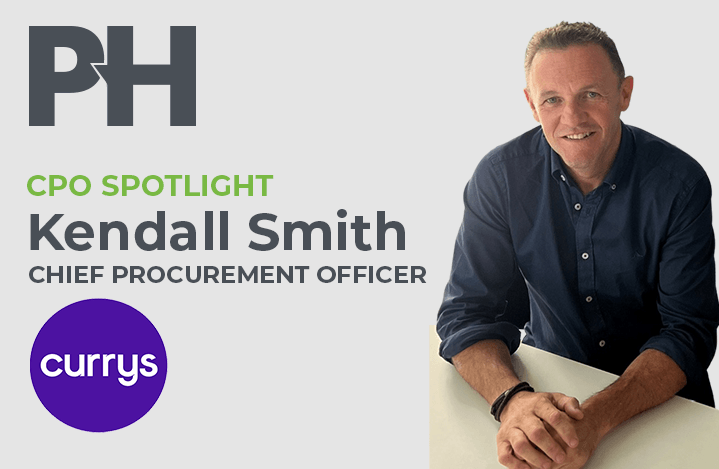Stephen Day is Chief Procurement Officer at Kantar, a world-leading data analytics and brand consulting company based in London.
For our latest CPO Spotlight, Stephen spoke with Sagar Bhardwaj, Head of Practice – Consumer, about what has changed for him professionally since he last spoke with Procurement Heads.
How much has changed for you professionally since your last Head2Head with us?
Our organisation is up and running, we have Category Managers, and we have regional teams. We have also built a delivery centre running our application environment.
Our Coupa Supplier Portal is now running 55% of our group spend and by the summer it will be up to 75%, that is three part – source to contract, information model and the procure to pay.
We have an amazing analytics dashboard, which gives us visibility on spend and suppliers’ contract duration, supplying really important insight.
We are also fortunate to have invested in a really diverse team.
D&I is such a broad topic; gender, sexual orientation, ethnicity, it is also cognitive diversity.
What’s more, we have set a target that we want to source 12% of our spend into diverse suppliers as a minimum by 2025, we are already at 8%.
Then we decided we would do a specific initiative where we would create opportunities for students to come and work with Kantar. We work with a local school in London and took five students last year, giving them experience in the working environment.
They are really bright students, full of energy and aspiration but don’t know how to penetrate the corporate world.
What we have been able to do is break down the barriers and myths and orientate them to the fact that this is within their grasp.
We are going to take 25 students in the summer, we are calling it ‘Intern London’ and we want to double it each year.
Did you change anything in your recruitment process to ensure diversity?
Firstly, I didn’t reach into the Stephen Day black book of contacts and start ringing them all up and saying “Do you want to join us?”
What I did was build the first layer of my leadership team, we talked about our ambition and what we wanted to achieve.
I then entrusted them to find candidates of that criteria and make the decision … once selected, I have a 20 minute ‘hello’ with them so I can tell them what we are trying to achieve and transform.
A lot of businesses have a D&I Coordinator, not that it is a bad idea, but you have to build this stuff into your ethos and everybody has got to own it.
What advice would you give people who are embarking on a procurement career journey?
I would say qualifications are like tickets to the next stage of your career.
You have got to think about two learning modes: Mode 1 is the act of being a practitioner and picking up the experience and being inquisitive.
Mode 2 is how you formulate that, either you decide to do an MCIPS or you decide to do an MBA.
The one thing is, you have got to be in constant learning mode. You have got to activate that learning muscle.
Kantar has had a big audit on its carbon footprint, how has the company’s sustainability journey progressed?
We did an EcoVadis submission for the first time in 2021 and got bronze, last year we got silver, so we are definitely on the right trajectory.
Sustainability has become a real deal because by 2024, companies need to begin to start publishing an auditable sustainability statement as part of their annual accounts sign-off, so if you think that P&L statements, cashflows have auditors all over it, this is certainly one more hurdle.
You have to report what steps you are taking, so we are preparing ourselves for having to be able to financially report what we are doing.
I am responsible for three things –
1) Property – we have very significant renewal activity…not just shrinking the estate but driving to improve our carbon footprint across existing and new properties.
2) Travel – electronic aeroplanes aren’t a thing just yet! We have reduced our travel, and utilised technology to bridge the gap but where we do need to travel, we have created an offset scheme which is really important.
3) Scope 3 -we are working with a couple of vendors at the moment to begin reporting out for the first time, what we think our entire carbon is across our supply chain.
How has the Kantar journey been since moving away from WPP family?
It is not for the faint-hearted!
We went from being a subsidiary of WPP, having a lot of things done for us, to having to do a lot of things for ourselves.
So you have to stand up all of your corporate infrastructure, and then transition off this set of arrangements that get put in place, these are called transition services agreements.
The second stage is an awful lot of transformation, a lot of people think PE is all about taking cost down, but it is also about growing the business and reprioritising the business services and investing in them so you can get the growth levels up.
We have done a lot of that, we have sold businesses and bought businesses.
The third and last stage is then really harnessing that so we can improve the financial performance of the business and ensuring we get an improved and better performance for our clients.
How much has procurement changed since you first entered?
Unbelievably.
Earlier in my career I was using green screen IBM technology so all those things you see in TV shows about things going on in the early 90s.
I worked for Rover cars when computers came in, in those days you had to book two hours to go and use a computer!
I think there are currently several interesting themes.
Firstly, I think procurement really needs to own the user journey and interface, again we have got a generation of people that are growing up with apps and the role of the procurement function is to make sure that generation coming into the workforce are interacting and using tools that have some consistency with what they have experienced in their personal lives.
They are demanding that the user interface is so important.
The second thing that is so important for procurement is content, curated content.
Again, back in the day, we would throw some hapless employee into an encyclopaedia of processes and procedures, none of which they could really understand and if they needed to source content, it was hard to do.
The same is true for suppliers as well, making it easy for a supplier to understand how they navigate a corporate business is just as important.
Lastly, we have talked a lot about diversity and inclusion and I think that goes with the territory.
It is a non-negotiable in my mind.
What is the one characteristic you think a successful leader should have?
I think the first thing, you have to be inquisitive, you have to be curious about what you are being told. You have to learn and sometimes kick the tyres on what you are being told.
Secondly, I look back and think one thing – I think I could have been more empathetic and kinder.
I think it goes with age and inexperience and sometimes you forget there is a way to engage and speak to people.
I have learnt a lesson there which subsequently I have improved upon so I think being kind to people is important.
The third thing is to be confident in your skin.
Imagine that the audience you are talking to most of the time doesn’t know a fraction of what you are talking about.
What new technologies do you see becoming integral to procurement over the next 5-10 years?
I think the era of corporate procurement wanting to specify how corporate technology should run is long gone.
What companies should be doing is buying generic, and focusing on the change management and the creation of value.
With that comes some new muscles you need to build – content creation, user journeys and all those sorts of things.
The other thing is the era of where businesses would rip out whole ERP systems, then replace them over multi-year projects is long gone.
The sheer number of Procure-Tech companies that are out there is really interesting.
Being more nimble and deploying capabilities at place and then really driving time to value is where we need to go.
I think it is a brave thing, being a leader that can challenge themselves and do things differently, I am not pretending that is me by the way!
But if you think about Steve Jobs, for example, he pulled the plug on products and then focused on what he thought would be good.
I think that the challenge for procurement people will be exactly the same.
Is there anything you would like to add?
I started a career I was really interested in and it turned out to be a wise choice.
Although I still have a few years left in my career, one thing I really want to do is get more accessibility into the profession and really evangelise why I think it is a great place to work.






